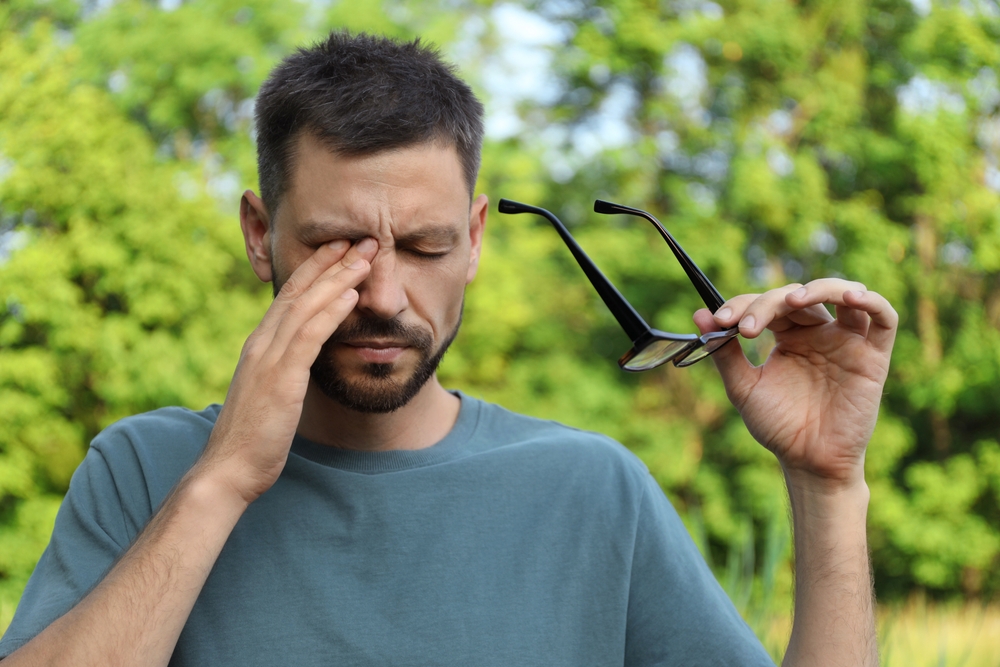
Dry eye syndrome and allergies are different eye conditions with several similar symptoms but different underlying causes. This is why many people confuse the two, making it difficult to get consistent relief. But that’s not all: Eye allergies can also cause dry eye syndrome, further complicating any attempt to differentiate between the two.
Dry Eye Syndrome
Dry eye syndrome occurs due to the failure of the eyes to produce enough quality tears to remain lubricated. The tears produced may be of poor quality, leading to quick evaporation. The condition is characterized by extreme dryness that causes the patient to experience a burning sensation. It can affect anyone but is more prevalent among senior adults. It affects almost five million people in the country.
Dry Eye Symptoms
Symptoms of dry eye include feeling something in the eye, burning, and ocular redness. Other symptoms are watery eyes, a scratchy feeling, mild itch, and a stringy eye discharge. The condition can lead to vision problems such as blurriness and light sensitivity if not treated. Severe cases can lead to permanent eye damage.
Eye Allergies
Eye allergies, also called allergic conjunctivitis, are caused by contact with various harmless substances. Put simply, the patient’s body overreacts to the substances. On alert, the body releases histamine to fight the substances, resulting in allergic reactions. The condition is very uncomfortable but is not contagious. Seasonal allergies are the most common form of allergies.
Allergy Symptoms
The most obvious symptom of eye allergies is itchiness. Most patients experience severe itchiness that leads to redness and tears from rubbing the eyes. The skin underneath and around the eyes becomes puffy, with some developing allergic shiners or dark under-eye circles. If your eyes are not itchy, it is more likely dry eye and not allergies. Other symptoms of allergies include light sensitivity, watery eyes, redness, and a burning sensation.
What Causes Dry Eye Syndrome?
Dry eye can occur due to various reasons. The condition can be caused by meibomian gland dysfunction, medications, health conditions, and environmental factors, such as smoke and low humidity.
Tear production reduces with age, which can lead to dryness. Menopausal women have a high risk of developing the condition. Failing to blink enough, especially when using digital devices, can cause eye dryness. Prolonged contact lens use can lead to dry eye.
What Causes Eye Allergies?
Most people experience allergies seasonally. If you experience symptoms during spring and fall, you are likely allergic to pollen and other substances in the air. Those who experience allergies all year long may be allergic to various substances. Allergens include dust mites, pet dander, smoke, mold, and fragrances. People with hay fever or nasal allergies are more likely to develop eye allergies.
Difference Between Dry Eye and Allergies
The main difference between dry eye and allergies is intense itching. Itching is more severe with allergies. Many symptoms overlap, making it crucial to visit an eye doctor for a proper diagnosis. The treatment will depend on the underlying cause of the condition. Note that allergies can lead to dry eyes.
Medications prescribed to treat allergies can reduce tear production, leading to dry eyes. Having dry eyes can also lead to allergies. A comprehensive eye exam can determine whether you have dry eyes or allergies.
For more on the difference between dry eye and allergies, visit Invision Family Eyecare at our office in Concord, North Carolina. Call (704) 795-3937 to book an appointment today.









